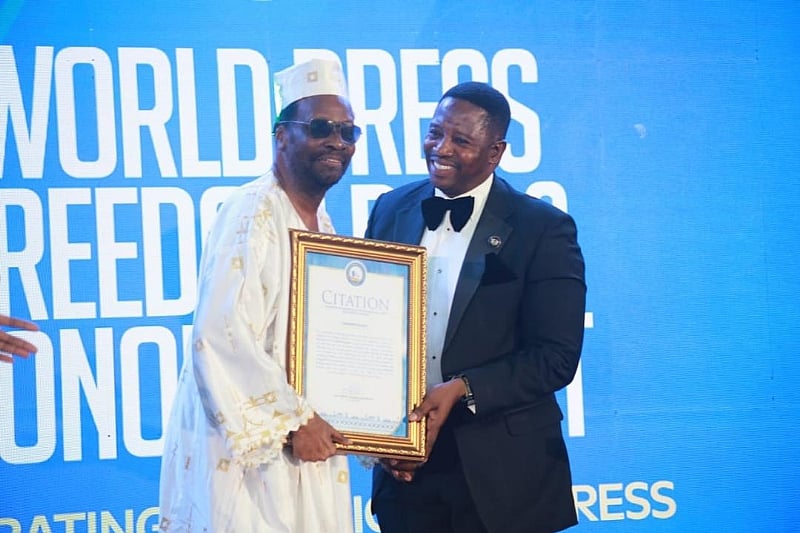Cameron Duodu, a venerable figure in Ghanaian and international journalism, stands as a testament to a life dedicated to intellectual rigor, unwavering integrity, and a profound sense of purpose. Born in 1937 in Asiakwa, Ghana, his journey was marked not by privilege, but by an unyielding determination to learn and to contribute. Despite financial constraints that prevented formal higher education, he embraced self-study, completing O-Levels and A-Levels through a correspondence course in a mere 15 months. This intellectual hunger fueled his passion for reading, which became the cornerstone of his remarkable career, shaping his insightful writing and critical analysis.
Duodu’s journalistic odyssey began at New Nation and the Ghana Broadcasting Corporation, where he honed his craft before ascending to editor of the Ghanaian edition of Drum, the prominent pan-African magazine. This milestone marked him as the first African to helm the publication, amplifying African voices on a global stage. His influence grew exponentially as editor of the Daily Graphic, Ghana’s leading newspaper, where his incisive editorials and fearless commentary resonated deeply. This prominence extended beyond Ghana’s borders as he contributed to renowned international publications like The Guardian, The Observer, The Economist, and Financial Times, bringing African narratives to a wider audience. His work also graced the pages of South and Index on Censorship magazines, while his voice became a familiar presence on BBC World and the BBC World Service, offering insightful perspectives on African politics, economics, and culture. Even today, well into his eighties, he continues to write for New African, City Press, and the Ghanaian Times, demonstrating an enduring commitment to his craft.
Beyond his prolific journalism, Duodu’s literary contributions further solidify his legacy. His 1967 novel, The Gab Boys, now a cornerstone of African literature, explores the complexities of post-colonial identity, ambition, and moral compromise, foreshadowing the literary activism that would characterize a subsequent generation of writers. His repertoire also encompasses poetry and plays, enriching the tapestry of African literary expression. When questioned about his most memorable articles, he hints at a treasure trove of experiences, suggesting the need for "a follow-up piece" to fully capture the depth and sometimes perilous nature of his journalistic pursuits.
Duodu’s life is interwoven with a rich tapestry of personal connections. The author’s personal association with him extends through shared educational experiences and familial ties with his children in Cape Coast, a hub of academic excellence in Ghana. This connection deepened through friendships within the Burma Camp community, fostering a lasting bond. Over time, the author’s acquaintance with the entire Duodu family grew, fostering admiration for the accomplished and close-knit family he and his wife built. Beyond familial links, Duodu’s intellectual circle encompassed prominent figures like the late Prof. Kofi Awoonor, a renowned poet and diplomat, and the author’s late father, Col. Peter Mama Agbeko, a distinguished lawyer and army officer. Their shared intellectual pursuits, often fueled by "some very cold and refreshing beer," provided a platform for spirited discussions on politics, literature, and the human condition.
Even in his eighties, Duodu’s passion for his nation’s welfare remains undiminished. He continues to engage actively in national discourse, particularly on the critical issue of "galamsey," the illegal mining practice that poses a severe threat to Ghana’s environment and future. His writings on the subject emphasize its existential danger, urging continued public awareness and action. This deep concern is reflected in his personal encouragement to the author to "keep writing on galamsey," underscoring his unwavering commitment to addressing this crucial issue.
Duodu’s broad interests extend to matters of faith and global leadership. Though not Catholic by birth, he holds a deep admiration for the late Pope Francis, recognizing in him qualities of humility, moral clarity, and courage that resonate deeply with his own values. This respect has shaped a nuanced and positive perspective on the Catholic Church. In recognition of his remarkable contributions to journalism, the Ghana Journalists Association (GJA) formally honored Duodu at the World Press Freedom Day and Honours Awards Night. This tribute acknowledged his pioneering work, his steadfast moral compass, and his enduring influence on generations of journalists. This influence extended to mentoring and guiding younger journalists, including the author’s classmate and friend, Kobby Asmah, during his tenure as editor of the Daily Graphic. This quiet mentorship reinforced the values of professionalism and truth-seeking that remain essential to journalistic integrity.
Cameron Duodu’s legacy transcends mere bylines and published works. It resonates in the lives he has touched, the ideas he has cultivated, and the standards he has set for the profession. He exemplifies journalism not as a mere occupation, but as a noble calling, grounded in truth, justice, courage, and an unwavering pursuit of knowledge. These values continue to inspire many, including the author, serving as a guiding compass in a complex world. As he celebrates his 88th birthday, the world celebrates not just another year of life, but a life of purpose, a life that has enriched Ghana, Africa, and the global community. Cameron Duodu’s continued writing, his ongoing engagement with critical issues, and his unwavering intellectual curiosity remind us that the pursuit of knowledge and truth is a lifelong journey. His life serves as a testament to the power of perseverance, intellectual curiosity, and a commitment to making a positive impact on the world. He remains a national treasure, a beacon of integrity and a source of continued inspiration.


